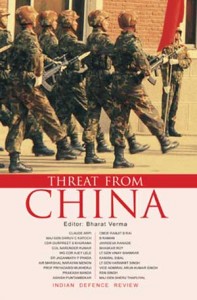The Leadership’s Nervousness
A great nervousness, coupled with this age-old complex of superiority renders the situation in China extremely unstable, not to say explosive. This explains President Hu Jintao’s obsession with ’stability’. China is fast changing, becoming more complex and ultimately an unmanageable entity. The leadership, particularly President Jintao often speaks of a ‘harmonious’ society, probably in contrast with the ‘chaos’ so much feared by the ancient Emperors. The Chinese word for ‘chaos’, ‘luan’ means the condition of a society falling into a disordered situation or an uncontrolled state. The Emperors used to lose Heaven’s Mandate to rule when ‘chaos’ prevailed.
Also read: Security threats facing India
The Chinese media may poke fun of India: “Proud of its ‘advanced political system’, India feels superior to China. However, it faces a disappointing domestic situation which is unstable compared with China’s”, but the Indian democratic process is a security valve16 which does not exist in the Middle Kingdom.
When Chi Haotian received his education, he was probably taught to listen to the leaderships in the Party and keep quiet, but it is no more the case in China.
The China Brief of the Jamestown Foundation reported in its June issue: “Widespread anger at the callousness, corruption and other misdemeanors of cadres, particularly those at the level of counties and below, is deemed a main factor behind the tens of thousands of riots and protests that occur every year. The latest such disaster, where some 10,000 peasants from Shishou town, Hubei Province clashed last week with police due to the latter’s alleged cover-up of the suspicious death of a local resident, has followed upon the heels of similar incidents in Hainan, Guizhou and Yunnan in the past year. In all these cases, law officers and other grassroots personnel offered protection to the rich and powerful instead of helping citizens who were victimized by corrupt cadres or triad elements.17″ Countless cases like the above are reported by the local media every year.
 However, while an authoritarian regime facilitates faster building of roads, airports or new cities, a one-Party system undermines the State in many other fields. One of these is long-term stability, which has serious military and strategic implications.
However, while an authoritarian regime facilitates faster building of roads, airports or new cities, a one-Party system undermines the State in many other fields. One of these is long-term stability, which has serious military and strategic implications.
The Importance of Democracy for a Stable State
It is ironic that the secret journal of the former Premier, Zhao Ziyang who was demoted after the 1989 democracy protests on Tiananmen Square is titled ‘Prisoner of the State‘. A Premier, prisoner of his own State18!
Zhao Ziyang’s biography published on the occasion of the 20th anniversary of the student’s massacre, explains why China is so unstable. By the end of the book, Zhao praises the parliamentary democracy system as the only way for China to solve its problems of corruption and the growing gap between the rich and the poor (and one could add the frequent ‘people’s’ riots).
For decades, ‘upholding social stability’ has been the core concern of the CCP. For China today, there is no reason to look at its southern neighbor in a patronizing way: India’s example proves that a multi-party rule (even if there are far too many) ultimately makes a State steadier.
Instability at the Borders
A case in point is Tibet, which 60 years after its ‘liberation’ is still under undeclared martial law. For Beijing, Tibet is a strategically important region as it is the physical base (with Xinjiang) for any land or missile attack against India.
Chinas younger generation is fast changing. The Internet and other modern communication means (text messages, blogs, etc.) have accelerated the process of change.
The riots which erupted in spring 2008 at different places on the Tibetan plateau demonstrate the precariousness of the Chinese defense preparedness. The leadership in Beijing, due to the one-party political system, seems unable to cope with the situation.
In March/April 2008, the Party immediately blamed the ‘Dalai Lama and his clique’ for the unrest. The morning after the first riot, a government official in Lhasa told Xinhua that there was enough evidence to prove that the events in Lhasa were “organized, premeditated and masterminded by the Dalai clique”. This has remained the official version of the two-month turmoil on the Tibetan plateau.
When the Dalai Lama dared to state that resentment was the main cause for the violent happenings, he was accused by Zhang Qingli, the Party Boss in Lhasa: “Those who do not love the motherland are not qualified to be human beings”. Shifting the blame on others has been an old practice of the Party’s apparatchiks.
Another factor concurs to make the present regime more unstable: China’s younger generation is fast changing. The Internet and other modern communication means (text messages, blogs, etc.) have accelerated the process of change. Despite the number of restrictions imposed by the State19, news has never circulated so fast and wide in the Kingdom.




